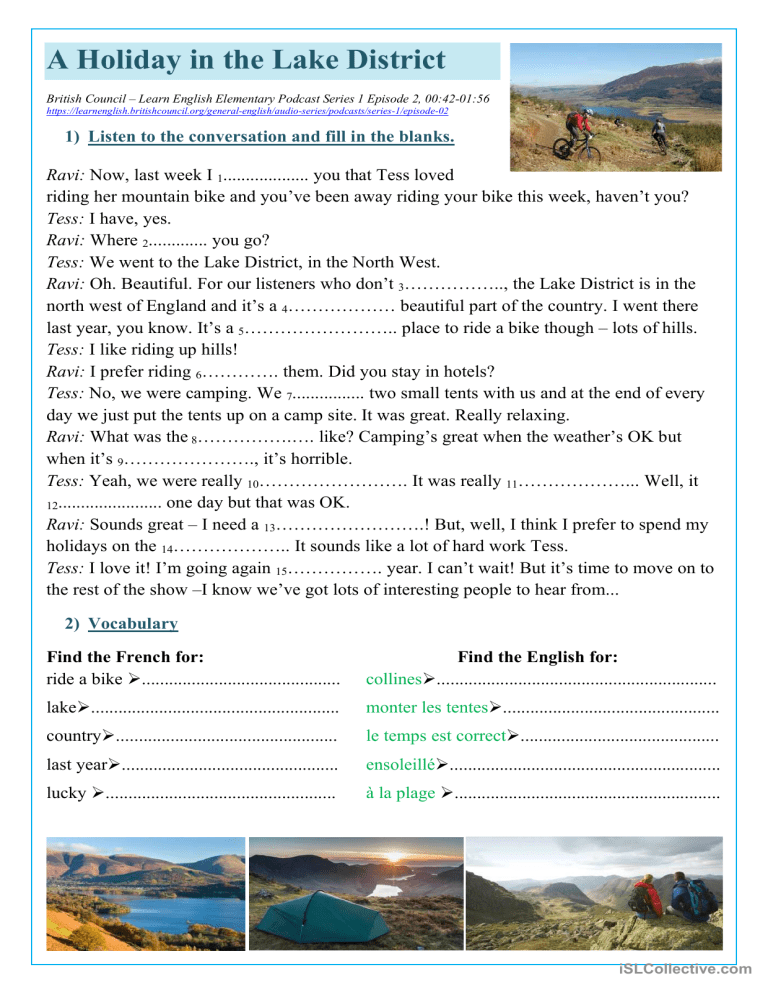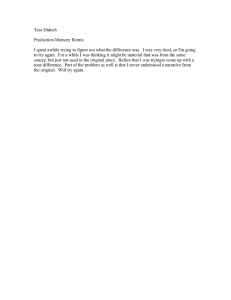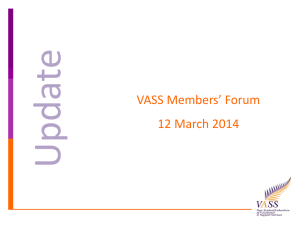
A Holiday in the Lake District British Council – Learn English Elementary Podcast Series 1 Episode 2, 00:42-01:56 https://learnenglish.britishcouncil.org/general-english/audio-series/podcasts/series-1/episode-02 1) Listen to the conversation and fill in the blanks. Ravi: Now, last week I 1................... you that Tess loved riding her mountain bike and you’ve been away riding your bike this week, haven’t you? Tess: I have, yes. Ravi: Where 2............. you go? Tess: We went to the Lake District, in the North West. Ravi: Oh. Beautiful. For our listeners who don’t 3…………….., the Lake District is in the north west of England and it’s a 4……………… beautiful part of the country. I went there last year, you know. It’s a 5…………………….. place to ride a bike though – lots of hills. Tess: I like riding up hills! Ravi: I prefer riding 6…………. them. Did you stay in hotels? Tess: No, we were camping. We 7................ two small tents with us and at the end of every day we just put the tents up on a camp site. It was great. Really relaxing. Ravi: What was the 8…………….…. like? Camping’s great when the weather’s OK but when it’s 9…………………., it’s horrible. Tess: Yeah, we were really 10……………………. It was really 11………………... Well, it 12....................... one day but that was OK. Ravi: Sounds great – I need a 13…………………….! But, well, I think I prefer to spend my holidays on the 14……………….. It sounds like a lot of hard work Tess. Tess: I love it! I’m going again 15……………. year. I can’t wait! But it’s time to move on to the rest of the show –I know we’ve got lots of interesting people to hear from... 2) Vocabulary Find the French for: ride a bike ............................................ Find the English for: collines.............................................................. lake....................................................... monter les tentes................................................ country................................................. le temps est correct............................................ last year................................................ ensoleillé............................................................ lucky ................................................... à la plage ........................................................... iSLCollective.com Practice Ravi doesn’t only ask questions. He also makes comments about what Tess says. This is normal in a conversation. We respond to what people say – maybe with our opinion, or some extra information about ourselves. 3) Look at this dialogue between Dave and Stella. Put the phrases in the box in the correct place. I went there a few years ago Was the weather good? Did you go with Pete? Good weekend? Yes, I know Bath Where did you go? It sounds great ! Where did you stay? He’d love it. Dave: Good morning Stella. 1………………………………… Stella: Great thanks. I went away. Dave: Lucky you! 2……………….……………….. Anywhere nice? Stella: I went to Bath. You know, near Bristol, in the South West. Dave: 3……………………………………It’s a fantastic place. 4………………..…………… Stella: No, Pete was working so I went with my sister. Dave: You went with Amy? That’s nice. Why did you choose Bath? Stella: Amy wanted to go – she’s really into old buildings. Dave: Yes, 5…………………………………………………….. I remember the Roman Baths – and of course, all of the old city is beautiful. There’s a lot of stuff to see. 6 …………. …………………………… Stella: In a hotel – not a very expensive one, but it was nice. The people were really friendly. And it was near the city centre so we could walk everywhere. It was great. Really relaxing. Dave: Well, walking’s OK if it isn’t raining. 7………………… ……………………………………… Stella: It was OK. Not fantastic, but OK. It was a bit cold but it was sunny. Dave: Perfect for walking! 8……………………………………………..…… Stella: Yes, it was. I’d like to go back again – maybe for a week or two. Dave: You should take Pete next time. 9…………………………….…………. iSLCollective.com If we know something about the person we’re talking to, and the place they visited, we can either ask a general question: What did you do? Or we can show that we’re interested by asking a more specific question: ‘Did you go to that wonderful museum?’. 4) Match the specific questions in the box to the general questions below. 1. Who did you go with? Did you try the local fish? 2. How did you travel? Did you go to that fantastic beach? 3. Where did you stay? Did you stay at the Rialto? 4. What did you eat? Did it rain a lot? 5. What was the weather like? 6. What did you do? Did you go with your brother? Did you take your car? 5) Imagine you are talking to a friend. Practise the following: You: Hi [name] …………………….! Nice holiday? Friend: Yes, I went away You: Where did you go? Anywhere interesting? Friend: Yes, I went to [place] ……………………………………………………………… You: I know [place] ……………………………………………. It’s [describe the place] ………………………………………………………………………………………………. [Ask another question] ……………………………………………………………………. Friend: …………………………………………………………………………………….._ You: [Make a comment] …………………………………………………………………………... [Ask another question] ……………………………………………………………………... You: [Make a comment] ……………………………………………………………………. [Ask another question] …………………………………………………………………….? Friend: ………………………………………………………….…. And what about you? Did you manage to get away? You: Yes, I went to [place] …………………………………………………………………. iSLCollective.com 6) To talk about past holidays, you’ll need to use the past simple. How does it work? Base form ending in… -e consonant + y vowel + consonant any other cases Irregular verbs How to make the simple past Add -d Examples like liked date dated Change -y into -i and add -ed cry cried try tried Double the consonant and add -ed commit committed hug hugged Add -ed call called look looked Check the list. go went take took To ask questions, use ‘did’ + subject + base form. Examples: Did you visit Mahhattan? Where did you go on holiday? When did you meet Brian? How did they travel? For negative statements, use ‘didn’t’ or ‘did not’ + base form. Examples: We didn’t visit Manhattan. I didn’t go to New York. I didn’t meet Brian. They did not travel. Practice: Answer the questions (write full sentences). Did you listen to music this morning? ………………………………………………………… Did you watch a movie last night? ……………………………………………………………. What time did you start class today? ………………………………………………………….. Did it rain yesterday? …………………………………………………………………………. Did you have orange juice for breakfast? ……………………………………………………... Where did you go on holiday? ………………………………………………………………... When did you do your homework? …………………………………………………………… Did you visit your family last weekend? ……………………………………………………… Where did you live when you were 5 years old? ……………………………………………... 7) Final task On a separate sheet, write a text to relate your best or your worst holiday memory. iSLCollective.com the 60 most common irregular verbs Rank Infinitive 2 45 19 43 37 32 44 49 6 35 55 44 38 36 58 30 50 17 60 51 4 15 3 39 1 25 46 26 to be to become to begin to break to bring to buy to catch to choose to come to cut to drink to drive to eat to fall to feed to feel to fight to find to fly to forget to get to give to go to grow to have to hear to hit to hold Past simple Past participle was / were became began broke brought bought caught chose came cut drank drove ate fell fed felt fought found flew forgot got gave went grew had heard hit held been become begun broken brought bought caught chosen come cut drunk driven eaten fallen fed felt fought found flown forgotten got given gone grown had heard hit held Translation être devenir commencer casser amener acheter attraper choisir venir couper boire conduire manger tomber donner à manger, nourrir sentir, éprouver battre, combattre trouver voler (dans les airs) oublier obtenir donner aller cultiver, grandir avoir entendre frapper, atteindre tenir iSLCollective.com 21 9 24 54 41 7 29 34 31 12 23 18 14 5 40 33 22 20 27 56 53 42 28 10 57 13 11 52 59 47 48 16 to keep to know to leave to let to lose to make to mean to meet to pay to put to read to run to say to see to sell to send to set to show to sit to sleep to speak to spend to stand to take to teach to tell to think to throw to understand to wear to win to write kept knew left let lost made meant met paid put read ran said saw sold sent set showed sat slept spoke spent stood took taught told thought threw understood wore won wrote kept known left let lost made meant met paid put read run said seen sold sent set shown sat slept spoken spent stood taken taught told thought thrown understood worn won written garder, rester connaître, savoir quitter, laisser, partir laisser, louer perdre fabriquer, faire vouloir dire rencontrer payer mettre lire courir dire voir vendre envoyer poser, fixer montrer s'assoir, être assis dormir parler dépenser, passer (du temps) être debout prendre enseigner dire, raconter penser, réfléchir lancer comprendre porter (des vêtements) gagner écrire iSLCollective.com


